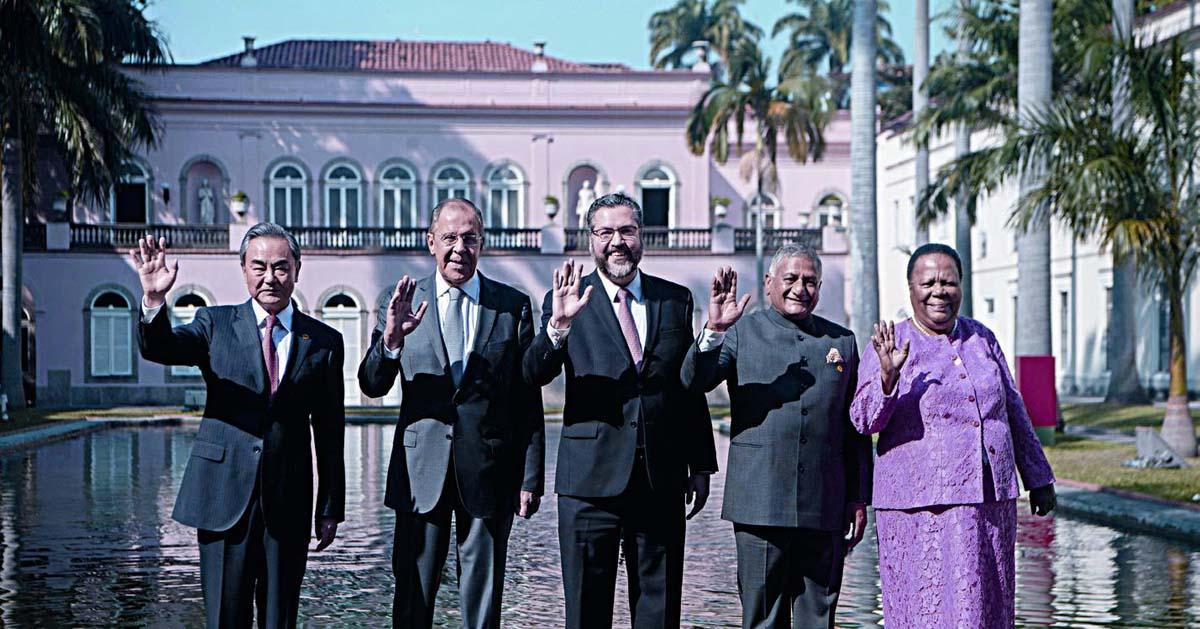What to Expect at the Brasilia BRICS Summit
By EVANDRO MENEZES DE CARVALHO
THE end of BRICSs first decade takes place in a different international context from that of its early years. At its inception, BRICS countries maintained high growth rates and enjoyed greater political and social stability. The economic crisis of 2008, which had the United States as its epicenter, gave rise to the need for greater participation of emerging economies in the process of defining the global economys direction. Today, 10 years after its first summit, BRICS faces different domestic circumstances and an international adverse context.
The global economy today is facing the risk of a new crisis due to the current trend of expanding protectionism. A World Bank report indicates that the global economy is expected to slow down, reaching 2.9 percent in 2019, because of weakening trade and reduced investments. U.S. protectionist and unilateralist foreign policy under President Donald Trump— subject to the “America first” principle — coupled with U.S. political tensions with Russia and the trade war against China, bring even more uncertainty about the global economys future and the international order itself. Domestically, only China and India have been able to maintain high GDP growth levels, even if compared to developed economies. Besides, all five BRICS countries face domestic problems of various natures. Given this scenario, what can be expected from the BRICS Summit in Brazil?
This years summit is the first major international event for Brazilian President Jair Bolsonaro, who is in his first year of presidency. Expectations arise about Brazils level of engagement in BRICS, i.e. whether it will be less or more active in the group. Some indica-tions of the new Brazilian governments foreign policy justify these expectations. In the first months of his presidency, Bolsonaro visited the U.S. and asked for Trumps support for Brazil to join the Organization for Economic Cooperation and Development (OECD), known as the “club of the rich.” And, more recently, the U.S. has designated Brazil as the countrys preferential military ally outside the North Atlantic Treaty Organization (NATO). These two facts can be interpreted as Brazils choice for a foreign policy more oriented to the West and less to the East; or more towards the Atlantic and less towards the Pacific.
However, such a conclusion still seems to be hasty. According to data from the Brazilian Ministry of Economy, from January to August 2019, Brazils trade with the U.S. was US $39.7 billion, while bilateral trade with China reached US $65.2 billion. In the trade balance with the U.S., Brazil has a deficit of US$351.5 million; and with China it has a US $17.7 billion surplus. The discrepancy is huge. Under BRICS, Brazils trade balance with South Africa shows a US $281.9 million surplus and a deficit with India and Russia of US $805.5 million and US $1.3 billion respectively. The weight of trade with China for the Brazilian economy contrasts with the low volume of trade Brazil has with other BRICS countries. This pattern remains the same when we look at intra-BRICS trade: China is the main partner of all other countries in the group.
Brazilian products find their main exports in the Pacific Ocean. And since China is Brazils main trading partner, it is reasonable to assume that the Brazilian government should give due importance to the arenas for dialogue and initiatives it has in conjunction with China. In this regard BRICS is the main arena, not only for its already evidenced economic dimension, but also for its strategic value. This is based on the following:
Asia has become the region with the greatest future prospects for the global economy. Brazil has developed diplomacy on the Asian continent capable of going beyond the bilateral approach by becoming a member of BRICS, founder of the New Development Bank (NDB), and founding member of the Asian Infrastructure Investment Bank (AIIB). This gives Brazil the opportunity to expand not only its trade, but also to develop diplomatic and business intelligence about Asian countries and business cultures that can be decisive for the countrys future.
In addition, the AIIB is a prime example of Asias attractive force. This bank already counts on Germany, Canada, Belgium, France, Italy, Portugal, Spain, and the United Kingdom as members, among others. One of the main motivations for these countries to be part of AIIB is that the bank will finance infrastructure projects that relate to the Belt and Road Initiative devised by Chinese President Xi Jinping in 2013. The Belt and Road Initiative will reach the European continent through Duisburg, in Germany, and Rotterdam in the Netherlands. Through BRICS, Brazil could play a greater role in understanding and sharing the benefits of this initiative.
As for a strategic point of view, given the U.S.-initiated trade and technology dispute against China, in the future, Brazil could play a role in mediating this dispute because of its privileged position as a member of BRICS. But despite the advantages and opportunities, Brazil is likely to reduce its engagement in certain BRICS agendas, especially those of a more political nature, such as IMF, World Bank and, above all, UN reforms. It is likely to give priority to the economic aspect of its agenda due to the crisis of its domestic economy and the inauguration of the regional headquarters of the NDB in the city of Sao Paulo.
However, it is noteworthy that sectors of Brazilian society, which benefit from trade relations with China, are pressuring the Brazilian government to adopt a pragmatic and flexible foreign policy, relinquishing an ideological bias which reinstalls the Cold War binary logic in favor of the U.S. and to the detriment of relations with China and the BRICS.
In an interview on BBC News Brazil, Economist Jim ONeill, the creator of the acronym “BRIC,” gave a negative answer when asked whether it was “a smart strategy for Brazil to opt for alignment with the United States rather than closer relations with China.” He replied, “From an economic point of view, if countries really have to choose, many of them would be crazy if they didnt choose China, and I think that applies to Brazil as well.”
The trade numbers given here seem to confirm that Jim ONeill does have a point. However, it would not be a matter of choosing between China and the U.S., BRICS or OECD, but of having a coherent foreign policy in defense of multilateralism and peoplesdevelopment. In 2019, at the beginning of BRICSsecond decade of existence, paying special attention to this group is a sign of good diplomacy. And good diplomacy is one which values dialogue, overrides the use of force as an instrument of negotiation, respects differences and, above all, promotes the development of people.
EVANDRO MENEZES DE CARVALHO is executive editor-in-chief of the Portuguese edition of China Today, a professor of international law, and head of the Center for Brazil-China Studies at the FGVs Rio de Janeiro Law School, Brazil.

